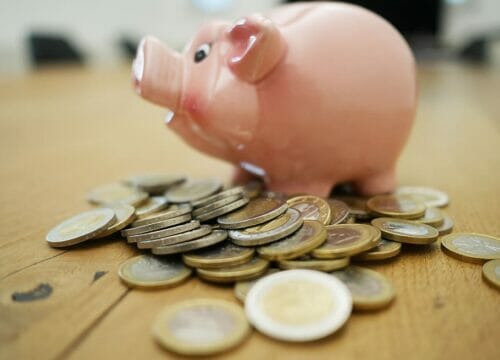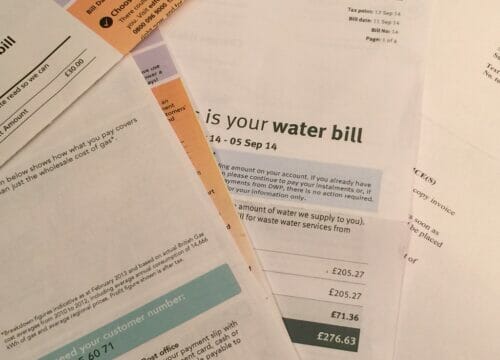
The Cost of Living
The rising cost of everyday items, like food and petrol.
From the fuel in our car to the food that we eat to the heating and electricity for our houses, many of the things that we need in our day to day lives cost money. Unfortunately, the cost of many of these items is going up and most people are not earning any more money in their jobs. This means that many people are finding themselves in a situation where they can no longer afford to pay for all the things they need.

What causes prices to go up?
Prices tend to go up when products become harder to get hold of, usually because lots of people want something that we don’t have much of!
You may have heard of something called a supply chain, which is effectively the stages from something being made until it gets to the shops for people to buy. Most people don’t even think about how things arrive in shops or get delivered to our homes. This shows the chain is working well. But sometimes, one part doesn’t go quite as smoothly as normal, and the whole chain falls apart.
Why have prices risen so much recently?
All around the world over the last couple years, a few things have happened at the same time that have disrupted supply chains. These include the Covid-19 pandemic, the UK deciding to leave the European Union and the war in Ukraine.
At the start of 2020, the world was struck by the Covid-19 pandemic. The virus was spreading faster than we could easily control and countries were forced to go into lockdown. People were asked not to go to work, many people lost their jobs and factories were forced to temporarily shut. Many of the companies making and distributing our food were no longer able to make the same amount of food as they used to, and we found ourselves in a position where there were food shortages. As food became harder to get hold of, it became more and more expensive too. As we now start to recover from the pandemic more and more people are going back to work. This means that more fuel is needed to power cars, the factories people work in and the power stations that make our electricity. This increase in the demand for fuel leads to the price going up. There are however a few jobs that people have decided not to come back to after the pandemic. This includes lorry drivers, many of whom have decided they can find a more enjoyable or better paid job doing something else. The shortage in lorry drivers has meant that we struggle to get food and fuel from where it is made to where people can buy and use it.
The shortage of lorry drivers has been worsened by the UK’s decision to leave the EU, known as Brexit. Previously many of the lorry drivers and other important workers who kept our supply chains ticking along smoothly were from outside of the UK. Since Brexit it is much more difficult for these key players to work here and many of them have had to return to where they are from causing a shortage of lorry drivers, fruit pickers and restaurant workers.
To add to the impacts of Covid-19 and Brexit on rising prices of important commodities, since the war broke out in February 2022, Russia and Ukraine have been unable to export the things that they make. This is a big problem because together Russia and Ukraine produce a lot of the world’s food and oil. For example, together they make up a third of all the wheat in the world. When a lot less wheat is being exported to countries such as the UK, the price for the smaller amount of wheat that is available goes up. This makes everything that depends on wheat go up in price as well. Not only is wheat used to make bread, cereal and pasta, but it is also used to make food to feed animals so that they can make meat and dairy for us to eat. Between May 2021 and May 2022, the price of a typical bag of pasta went from 36p to 53p. A similar story is true for oil prices. In normal times Russia makes about 10% of the oil that is used all around the world. So, when we can’t get oil from Russia, there isn’t very much oil to go around, and the price gets pushed up. In 2021 the average household was paying £111 per month for gas and electricity, whereas towards the end of 2022 this cost had risen to £164 per month. This means that households were having to spend about £53 more every month to heat their homes, charge and power their electrical appliances, use their stoves to cook, and so on.
The rising cost of things is known as inflation. In between August 2021 and August 2022 the inflation rate was about 10%. This means that if something cost £100 in August 2021, it would cost £110 in August 2022.
So what’s the problem?
The rising cost of living is having impacts on millions of people’s lives. Although prices are going up, most people’s salaries or government benefits are not going up by the same amount, so suddenly people find themselves in a position where they don’t have enough money to buy the things that they used to buy.
For people and families who were already finding it a struggle to afford everything, this might mean that they cannot turn their heating on as much as they would like to or, in some cases, at all. Or they might be unable to afford the same quantity and quality of food as they previously were. The UK’s Office for National Statistics found that nearly half of British people have cut back on how much food they buy because of the rising prices. Many people may be forced to go to charities or foodbanks for help.
Businesses like shops and restaurants might not be able to afford their costs anymore and might have to close down. Even schools might have to spend less money on things like school trips or after schools clubs so that they can afford the higher costs of food and electricity that they have to pay.

What is being done to help?
The UK government have put in place a number of measures to help people pay for the things they need. For example, all homes in the UK are being given some money to help with their energy bills this autumn so that people can still heat their homes, cook hot food and use electrical appliances. They have also offered to refundsome money that people paid on council tax.
But many people and charities say that the government still isn’t doing enough and are afraid that prices could keep rising.

How can people like you help?
If you want to do something to help, real power is in your hands to help make a difference.
You can:
- Raise money for The Trussell Trust who help run food banks across the UK so that no one goes hungry. You could organise a bake sale at school and ice the cakes with green icing to match The Trussell Trust colours.
- Donate essential items to charity. Or if you are feeling keen, you could organise a donation drive at your school. You could collect food and donate it to a charity such as The Trussell Trust, or books and donate them to a charity such as The Children’s Book Project.
- Write a letter to your MP to ask them to do more to support those affected by the rising cost of living. For example they could make sure that people receiving benefits from the government get more money in benefits as inflation means their cost of living goes up.


